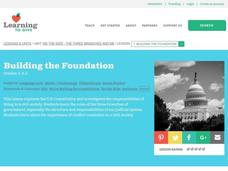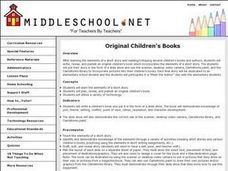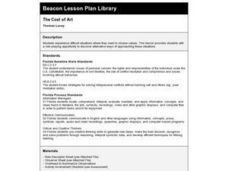Thoughtful Learning
Learning to Say No
It's not always easy to say "no". Give scholars the power and confidence to stand up for themselves with several steps to communicate using their voice and body language.
Utah Education Network (UEN)
Reflective Listening Skills
Do you ever feel like your conversation partner is just nodding along as you speak? Encourage teenagers to become reflective listeners with a short activity in which they form responses to assertive statements to reflect what the speaker...
Advocates for Youth
Can I Keep Violence out of My Life?
Many teenagers in your class have not experienced violence in their lives, much less as a daily occurance. But some pupils are not so lucky. Bring hope to your class that violence is not an inevitable part of life, and that they can...
Health Smart Virginia
Social Emotional Skills Lessons Overview
Sometimes the hardest part of planning any unit of instruction is determining the activities that reinforce the concepts of the lessons and support the development of student skills. This first resource in the Health Smart series...
Conflict Resolution Network
Empathy
Children are naturally friendly and communicative, but often have a hard time expressing their emotions in a clear and understandable way. Help them hone their communication skills with a set of activities based on creating empathy,...
Thoughtful Learning
Taking Action Against Bullying
A mini-lesson offers suggestions for young learners on how to take action against bullying, both for themselves and others. Individuals then craft a paragraph about strategies they might use.
United Nations
Peace Worksheets
Children are the voice of the future—and they are the best chance the world has for international peace. Help them secure peace in their lifetimes with a lesson based on the history of the United Nations, which includes a space for...
Missouri Department of Elementary
The Clique
Mean girls and bully packs are favorite topic for films and TV shows that focus on the destructive power of cliques. High school freshmen are asked to reflect on both the positive and negative aspects of cliques by reading a short...
Curated OER
India and Pakistan: a Simulation of Outcomes
Students become aware of world conflicts and how conflict resolution is used to minimize threats around the world. They analyze a current world conflict and utilize conflict resolution strategies to determine a viable peace initiative.
Curated OER
UN Conference on the Impact of Civil War on the Common Person
Students simulate understanding of conflict or civil war they researched, and role play character they developed at model UN conference on the impact of civil war on the common person.
Curated OER
Building the Foundation
Students understand the purpose of the judicial branch of government. In this judiciary lesson, students participate in exercises to understand how the court system works. Students complete activity sheets to develop understanding of...
Curated OER
Hear No Evil, See No Evil, Speak No Evil
Second graders explore conflicts that occur in the school setting.
Lee & Low Books
First Come the Zebra Teacher’s Guide
Accompany a reading of First Come the Zebra written and illustrated by Lynne Barasch with a teacher's guide equipped with before reading, vocabulary, and after reading activities. Additional social studies,...
Curated OER
Building Friendships
Students engage in four separate friendship-building activities. They develop social skills and ethical responsibility by role playing and interacting with each other through reading, art, music and dance.
Curated OER
Collaborative Choreography, Contrasting Emotions
Students demonstrate choreographic principles, processes, and structures.
Curated OER
Collaborative Writing
Collaborative writing projects can be a lot of fun for students. They use a Scholastic Story Starter and the class blog to write a creative story containing basic story elements. The web link to Scholastic is included but non of the...
Curated OER
A Peaceful Place Is Powerful for the Mind
Fourth graders explore, analyze and interpret how schools can become peaceful places to learn and interact with others. They study a wide variety of avenues to achieve this task through classroom, community and career activities...
Curated OER
Trash! How Cities Work: Dealing with Garbage in the US and India
Students identify how different cultures deal with the challenge of trash. Read an excerpt from a chapter book based on real life written from the Southern Indian perspective. Describe the life of a street child in Southern India....
Curated OER
Fast Food and Daily Nutrition Choices
Students explore food. In this nutrition activity, students investigate multiple facets of healthy eating and how the fast food industry impacts our society. They will participate in class discussions, read from their text-book, and...
Curated OER
Famous Peacemakers - Creating a Declaration of Peace
Students create written reports about a famous peacemaker. In this peacemaker lesson plan, students use books and the internet to research someone who is famous for creating peace in the world and write a report on it.
Curated OER
Rules of Conduct: Media Violence, Dating and Teenage Behavior
Students discuss the role of media in their lives and making decisions. In groups, they define violence and identify how it is represented in the type of entertainment they are accustomed to viewing. They compare and contrast behaviors...
Curated OER
Original Children's Books
Bring the fun and creativity of children's stories to your language arts class. Middle schoolers write, revise, and publish an original student book which incorporates the elements of a short story. They put their story in the form of a...
Curated OER
Comic Book Project
Students write a comic. In this writing instructional activity, students discuss comic books and why they continue to be so popular. Students create a comic book using an imaginary character. Students must present a problem and solution...
Curated OER
The Cost of Art
Fourth graders experience difficult situations where they need to choose values. This lesson provides students with a role-playing opportunity to discover alternative ways of approaching these situations.

























